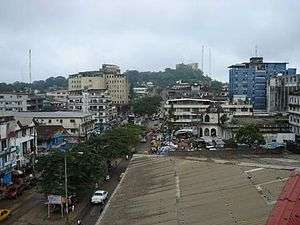United Nations Security Council Resolution 1647
United Nations Security Council Resolution 1647, adopted unanimously on 20 December 2005, after recalling all previous resolutions on the situations in Liberia and West Africa, the Council extended sanctions including an arms embargo, bans on the sale of diamonds and timber and restrictions on travel for certain officials.[1]
| UN Security Council Resolution 1647 | |
|---|---|
 The Liberian capital Monrovia | |
| Date | 20 December 2005 |
| Meeting no. | 5,336 |
| Code | S/RES/1647 (Document) |
| Subject | The situation in Liberia |
Voting summary |
|
| Result | Adopted |
| Security Council composition | |
Permanent members | |
Non-permanent members | |
Resolution
Observations
The Security Council began by welcoming the successful conduct of elections in Liberia, which it viewed as an important step towards the peace and stability of the country. It welcomed the commitment of Ellen Johnson-Sirleaf to rebuild Liberia to benefit the people.[2]
Meanwhile, the Council concluded that "insufficient progress" had been made with respect to meeting the conditions of resolutions 1521 (2003) and 1532 (2004), which imposed sanctions on Liberia.
Acts
Acting under Chapter VII of the United Nations Charter, the Council extended the arms embargo and travel restrictions for a period of twelve months, and restrictions on the sale of diamonds and timber for a period of six months.[3] The measures would be reviewed at the request of the Liberian government.
The resolution welcomed the determination of President Ellen Johnson-Sirleaf to meet the criteria required and encouraged the new government of the country to engage in forestry reform and management of diamond resources. Furthermore, it welcomed assistance provided to the Liberian government by the United Nations Mission in Liberia.
An expert panel monitoring the implementation of sanctions against the country had its mandate extended until 21 June 2006.
See also
References
- "Security Council, in unanimous Chapter VII decision on Liberia, renews bans on sale of arms, diamonds, timber". United Nations. 20 December 2005.
- Lederer, Edith M. (21 December 2005). "UN maintains sanctions against Liberia". Independent Online (South Africa).
- Machacek, Erika (2011). Sustainable Development in Western Anglophone Africa: Analysis of Millennium Development Goal 7's Viability 'Ensuring Environmental Sustainability in Forest Management' Under Corruption Aspects in Ghana and Liberia. GRIN Verlag. p. 146. ISBN 978-3-640-84310-7.
External links

- Text of the Resolution at undocs.org